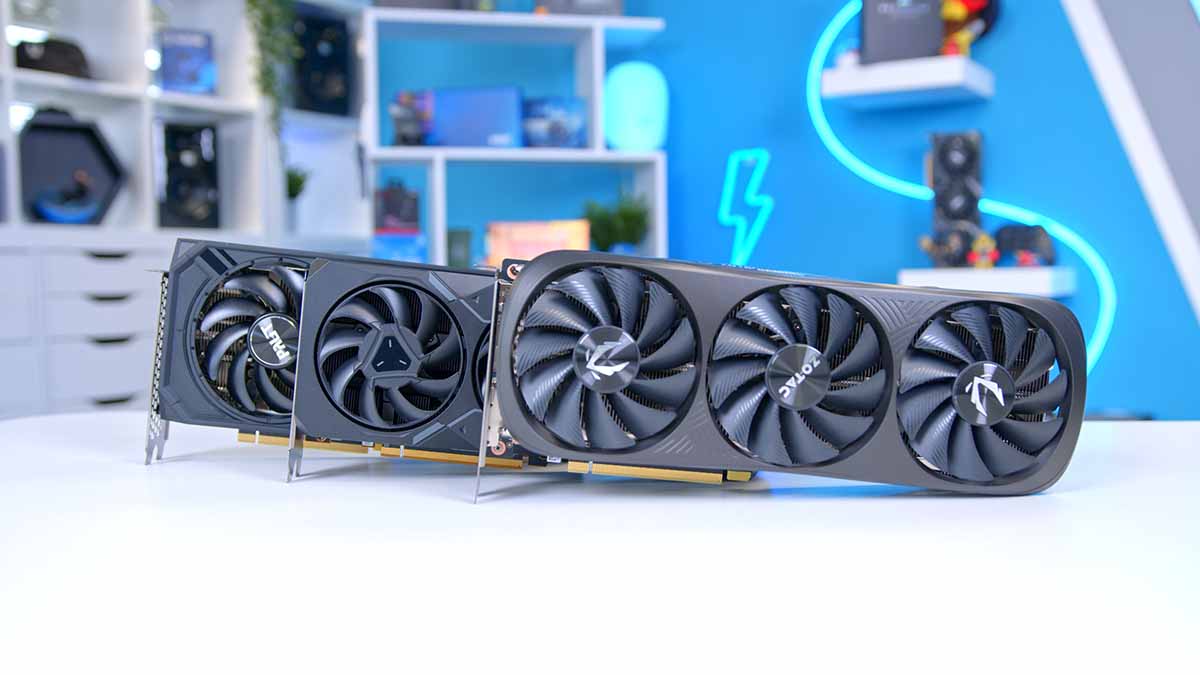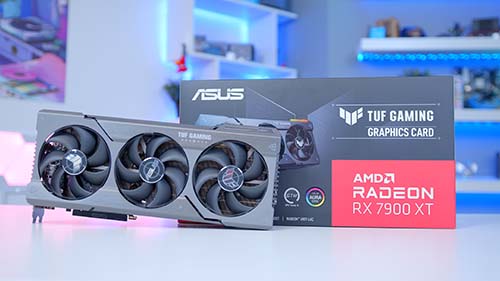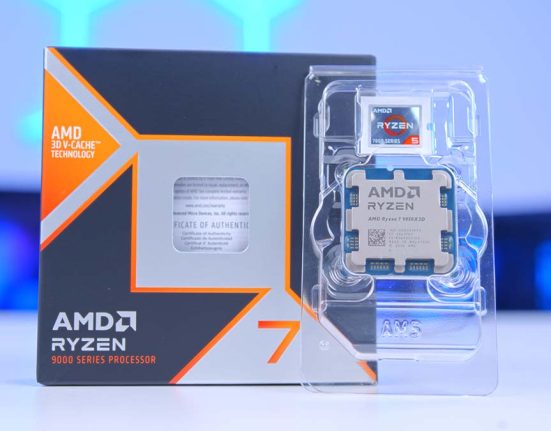An $800 budget for a graphics card is a healthy amount for those looking to game at the top-end 1440p and 4K resolutions. Naturally at such a high budget, there are a myriad of high performance GPUs to choose from within this budget limit.
In this buyers guide we’ll be walking through our GPU recommendations under $800, delving into the specs and hardware, along with the performance that can be expected from each card. All of the graphics cards in this roundup have been rigorously tested and compared against a huge dataset of other competitor cards to see what kind of value proposition is on offer. You can also read in full detail about our testing procedures in our how we test graphics cards article.
1. AMD Radeon RX 7900 XT

The RX 7900 XT is highly popular GPU under $800, thanks to a number of price drops since its initial launch. With a revised MSRP of $699.99, the RX 7900 XT is one of the best priced graphics card for 4K gaming. With 20GB of GDDR6 VRAM and a 320-bit memory bus, the RX 7900 XT is highly capable, with plenty of memory bandwidth and capacity to boot. This allows you to crank up the graphics settings across Esports and AAA titles.
This GPU offers a boost clock speed of 2.4GHz, along with 5376 stream processors, and 84 ray accelerators. Power draw sits at 315W which is quite hefty, and AMD recommends a 750W power supply as a minimum for this graphics card. Prospective buyers can leverage Fluid Motion Frame technology alongside FSR 3, which enhances and bolsters framerates across supported games through interpolation technology.
| Key Specs | AMD Radeon RX 7900 XT |
|---|---|
| Video Memory Capacity | 20GB GDDR6 |
| Memory Bus | 320-Bit |
| Base Clock Speed | 1.5GHz |
| Boost Clock Speed | 2.4GHz |
| Stream Processors | 5376 |
| Ray Accelerators | 84 |
| Power Draw | 315W |
| MSRP | $699 |
The only major weakness to consider is the ray tracing capability of the RX 7900 XT. While this graphics card can easily handle rasterized gameplay, AMD hasn’t caught up to NVIDIA when it comes to ray tracing. The result of this, is that AMD GPUs suffer more heavily on the framerate front, with RT enabled in most titles. This is where an NVIDIA RTX 4000 card would serve as a better alternative.


Suggested Article: Best Budget Graphics Cards to Buy in 2023
2. NVIDIA GeForce RTX 4070 Ti SUPER

The NVIDIA RTX 4070 Ti SUPER is an excellent graphics card that comes off the back of a mid-life refresh to NVIDIA’s existing RTX 4000 series. Adding more memory over the original RTX 4070 Ti and a small boost to core counts, the RTX 4070 Ti SUPER provides great performance at 1440p and 4K. It is worth noting that the SUPER graphics cards are not intended as an upgrade for existing RTX 4000 series users, but act as a better alternative for those shopping for a new GPU.
Now with 16GB of GDDR6X VRAM, an increase of 4GB over the RTX 4070 Ti, the RTX 4070 Ti SUPER brings more longevity and headroom for boosting graphics settings. CUDA cores are up from 7680 to 8448, while RT cores rise from 60 to 66. Power draw has however remained the same at 285W, meaning no shift to PSU requirements
Overall performance is very strong at 4K, with even better metrics at 1440p. The Ada Lovelace architecture also brings with it DLSS and Frame Generation, which significantly improves framerates in supported games. Ray traced performance is also excellent, which is one of the major benefits of NVIDIA RTX 4000 GPUs.
| Key Specs | NVIDIA GeForce RTX 4070 Ti SUPER |
|---|---|
| Video Memory Capacity | 16GB GDDR6X |
| Memory Bus | 256-Bit |
| Base Clock Speed | 2.34GHz |
| Boost Clock Speed | 2.61GHz |
| CUDA Cores | 8448 |
| RT Cores | 66 |
| Power Draw | 285W |
| MSRP | $799 |
The biggest caveat of the RTX 4070 Ti SUPER is its price point. While the SUPER refresh does put this GPU in a much better position, alternatives like the RX 7900 XT do offer up better value for money on a number of fronts.


3. NVIDIA GeForce RTX 4070 SUPER

The RTX 4070 SUPER was the first GPU to launch within NVIDIA’s ‘SUPER’ refresh. This card brings some slight hardware upgrades versus the original RTX 4070, while maintaining the same MSRP.
In terms of specs, the RTX 4070 SUPER retains the 12GB of GDDR6X VRAM and 192-bit memory bus, but upgrades the RT and CUDA core counts up to 56 and 7168 respectively, which brings performance improvements to rasterised gameplay and ray tracing.
One area of change on this card is the increase in power draw to 220W, something which facilitates the increased performance. The RTX 4070 SUPER is more geared towards 1440p gaming and can easily cope with the demands of modern AAA titles. Ray tracing performance at 1440p is also excellent too, which is down to the capability of the Ada Lovelace architecture.
| Key Specs | NVIDIA GeForce RTX 4070 SUPER |
|---|---|
| Video Memory Capacity | 12GB GDDR6X |
| Memory Bus | 192-Bit |
| Core Clock Speed | 1.98GHz |
| Boost Clock Speed | 2.48GHz |
| CUDA Cores | 7168 |
| RT Cores | 46 |
| Power Consumption | 220W |
| MSRP | $599 |
The most important caveat to consider with the RTX 4070 SUPER is its 4K performance. While the RTX 4070 SUPER can cope with 4K gaming in many titles, there are other cards within this roundup that are better positioned to handle the demands of 4K gaming at a higher price point.


How We Tested the Best Graphics Cards Under $800
To provide informed product recommendations, we require a huge amount of data. This is why all of our graphics cards are tested rigorously and methodically to ensure we have a big data set to compare and consolidate which graphics cards are worth recommending. All of the GPUs we have, are tested at three different resolutions at varying settings within AAA and Esports titles to ensure we have a full suite of current and relevant benchmarks.
To make sure that all of our testing is fair and repeatable we’ve published a full rundown of our settings in a how we test graphics cards article. There you’ll find a deep dive on our full benchmarking methodology.
Hogwarts Legacy @ 1440p
Settings: 1440p, Shadow Quality High, Indirect Lighting High, Reflections High, Crowd Density High, Particle Quality High, Volumetric Lighting High, Motion Blur off, GTAO Quality High, Grass Quality High, Contact Shadows High VSync Off, DLSS/FSR: On/Off, Ray Tracing: On/Off, Textures: High
In Hogwarts Legacy at 1440p high settings, the RTX 4070 Ti SUPER sits at the top of the graph, with an average framerate of 117FPS. The RX 7900 XT only sits 2FPS behind this, outputting an average of 115FPS. Admittedly, the RTX 4070 SUPER does fall behind a bit more, with a 104FPS average.

Hogwarts Legacy @ 4K
Settings: 4K, Shadow Quality High, Indirect Lighting High, Reflections High, Crowd Density High, Particle Quality High, Volumetric Lighting High, Motion Blur off, GTAO Quality High, Grass Quality High, Contact Shadows High VSync Off, DLSS/FSR: On/Off, Ray Tracing: On/Off, Textures: High
Stepping the resolution up a notch to 4K, framerates shifted slightly with the RX 7900 XT leading against the RTX 4070 Ti SUPER and RTX 4070 SUPER with an 88FPS average. The RTX 4070 SUPER and RTX 4070 Ti SUPER sat pretty close together with 62FPS and 67FPS respectively.

Apex Legends @ 1440p
Settings: 1440p, Anti-aliasing TSAA, Texture Filtering 8X, Model Detail High, VSync Disabled, Effects High, Ambient Occlusion Quality High
In Apex Legends at 1440p, framerates were much higher across our testing, with the RX 7900 XT coming out on top again with a 263FPS average. The RTX 4070 Ti SUPER doesn’t sit too far behind with 256FPS, while the RTX 4070 SUPER drops even further with a 235FPS average.

Apex Legends @ 4K
Settings: 4K, Anti-aliasing TSAA, Texture Filtering 8X, Model Detail High, VSync Disabled, Effects High, Ambient Occlusion Quality High
Yet again, the RX 7900 XT comes out on top versus the RTX 4070 Ti SUPER and RTX 4070 SUPER with an average framerate of 188FPS. Admittedly both of NVIDIA’s GPUs still held up very well overall, with the RTX 4070 Ti SUPER offering up 177FPS, and the RTX 4070 SUPER sat around the 162FPS mark.

Frequently Asked Questions
Is DLSS Better than FSR?
Yes it is, but only marginally. While visual fidelity is often better when DLSS is enabled, FSR has caught up in a number of ways, and is supported in a massive suite of games.
Is NVIDIA or AMD Better for Ray Tracing?
NVIDIA are the current kings of ray tracing, due to the vastly superior ray tracing architecture that they have. While AMD are slowly catching up, NVIDIA cards are stronger across the board in ray traced gameplay.
How Much VRAM Do I Need for 4K Gaming?
As a general rule we’d recommend picking up a graphics card that has a minimum of 12GB of video memory.








![FI_[DM89] Phanteks Evolv + AORUS 5090 9850X3D Gallery (8)](https://geekawhat.com/wp-content/uploads/2026/02/FI_DM89-Phanteks-Evolv-AORUS-5090-9850X3D-Gallery-8-551x431.jpg)
![FI_[DM88] 16GB DDR5 9060 XT Build Gallery](https://geekawhat.com/wp-content/uploads/2026/02/FI_DM88-16GB-DDR5-9060-XT-Build-Gallery-551x431.jpg)
![FI_[DP059] Corsair Frame 4000 + 9070XT](https://geekawhat.com/wp-content/uploads/2026/01/FI_DP059-Corsair-Frame-4000-9070XT-551x431.jpg)
![FI_[SR190] HYTE X50 Ryzen 5 9600X & MSI RTX 5070 Ti](https://geekawhat.com/wp-content/uploads/2026/01/FI_SR190-HYTE-X50-Ryzen-5-9600X-MSI-RTX-5070-Ti-551x431.jpg)
![FI_[DM87] HAVN BF & RTX 5090 Build](https://geekawhat.com/wp-content/uploads/2026/01/FI_DM87-HAVN-BF-RTX-5090-Build-551x431.jpg)